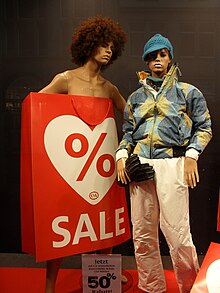Season end sale
A seasonal end-of-season sale is a special event in the retail trade with the aim of selling off seasonally-specific goods from the past season through price reductions and creating space for the goods of the coming season. In Germany, the previously common season-specific terms for end-of-season sales: "summer sales" (abbreviated to "SSV") and "winter sales" ("WSV") in the brochures and shop windows of the shops and in them at the point of sale were mostly given by the anglicism " Sale " replaced.
History in Germany
In the law against unfair competition (UWG) of June 7, 1909, end-of-season sales were regulated for the first time. One reason was that until then only civil servants and factory employees had the chance of factory sales. In 1950, the Federal Ministry of Economics introduced the “Regulation on summer and winter sales”.
According to Section 7 Paragraph 3 Clause 1 UWG a. F. Carry out two end-of-season sales per year: the winter sale took place annually in the last week of January and the first week of February , the summer sale in the last week of July and the first week of August .
The end-of-season sales lasted twelve working days each and were limited to seasonal goods such as textiles , clothing , footwear , leather goods and sporting goods. In addition to clothing, textiles also included upholstery fabrics and carpets and mattresses , but only if they were mainly made of textile materials. Suitcases and handbags were only allowed to be included in the end-of-season sale if they were made of leather or textiles, e.g. B. no hard case. The inclusion of other product ranges and product groups such as glass, porcelain and ceramics (GPK), electrical appliances (brown and white goods), stationery, etc. was completely inadmissible.
Since the reform of the law against unfair competition of 3 July 2004 came into force, end-of-season sales can be carried out at will and are not limited to seasonal goods, as the regulations of §§ 7 and 8 UWG a. F. were canceled without replacement.
Current practice
It is customary to continue to carry out end-of-season sales at similar times as before, on the one hand because the original reason for the introduction of sales (change in the range of goods) persists, and on the other hand because consumers have got used to being able to shop cheaply at these times.


